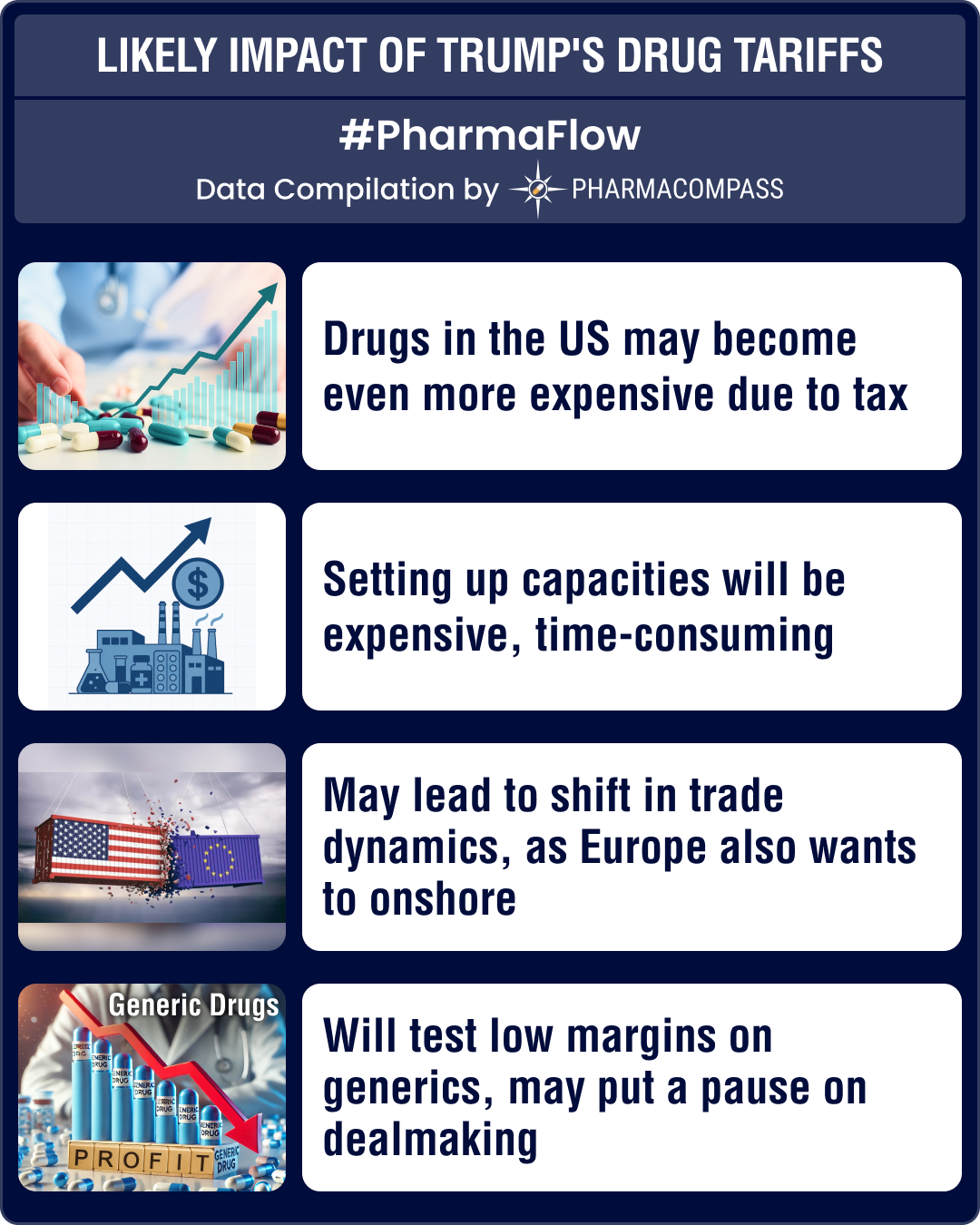
This week, Phispers brings you news on the probable new head of the US FDA. Meanwhile, pharma biggies like Mylan, Endo, Eli Lilly, AstraZeneca and Sanofi have announced restructuring and layoffs, Switzerland’s Lonza has announced plans to buy Capsugel and Perrigo plans to offload its API plant in India to Strides Shasun. And there is more, read on.
Trump likely to pick venture capitalist Scott Gottlieb to head FDA
America’s President-elect Donald Trump is considering Scott Gottlieb, a partner at one of the world's largest venture capital funds and a former deputy commissioner at the US Food and Drug Administration (FDA), to run the government healthcare agency.
News comes days after Jim O’Neill — managing director at Mithril Capital Management, a venture capital firm run by Peter Thiel (the billionaire Trump donor and transition team advisor) — was said to be considered for the FDA top-job.
According to Michael Gaba, federal policy leader of law firm Holland & Knight’s national healthcare and life sciences team, Gottlieb is a more “palatable” choice, as opposed to O’Neill, who believes that drugs should be allowed on the market before their efficacy has been established, as long as they are safe.
Because if O’Neill heads the FDA, neither the doctor nor the drug maker would have a clue whether the medicine will actually work or not, because the government never required it to be tested.
Gaba is of the view that the drug industry too is likely to oppose O’Neill’s stance, since companies want to be able to make credible claims about their products, and that they are indeed effective in treating the ailments they claim to treat.
Layoffs at Sanofi, Lilly, Mylan, AstraZeneca and Endo
Over the last week, five pharmaceutical biggies that together account for a market cap of US $ 228 billion in the US bourses — Mylan, Endo Pharmaceuticals, Eli Lilly, AstraZeneca and Sanofi — have announced major restructuring and layoffs.
The decisions of these companies are driven by a number of factors ranging from failures in clinical trials to feeling the need to squeeze off dead weight in the face of wilting sales.
There was some good news for Endo — its Par Pharmaceutical unit launched the first copycat of Merck’s cholestrol-fighting drug Zetia. Endo’s Zetia is the only copycat for six months under FDA exclusivity rules. Though Merck’s Zetia sales (pegged at US $ 2.5 billion in 2015) is likely to suffer from this copycat drug, the company will face the biggest declines in Zetia sales after that 180-day monopoly ends next year. That’s when multiple generics players are likely to jump in the fray.
For Endo, the Zetia generic presents an opportunity to recoup sales as it struggles to redefine itself. Endo’s generic launch comes just after it cut 375 staffers and pulled the plug on a pain med project. Endo bought Par Pharmaceutical last year for US $ 8 billion. Par will share profits for the generic with its licensing partner — India-based Glenmark Pharmaceuticals.
Eli Lilly also had some good news — in the coming weeks, two leading US medical societies are poised to issue new diabetes treatment guidelines reflecting the lifesaving cardiovascular effects of Eli Lilly's Jardiance. This is likely to push up Jardiance sales.
Swiss drugmaker Lonza in talks to buy Capsugel for around US $ 5 billion
In a statement, Lonza Group AG, the Swiss pharmaceutical manufacturer, said it is in advanced talks with private equity firm KKR & Co LP to acquire Capsugel, an American manufacturer of capsule products and other drug delivery systems.
The potential transaction, according to sources quoted in a Reuters news report, is likely to be valued at more than US $ 5 billion.
Capsugel “would fit perfectly with Lonza’s ... strategy and strengthen its position as leading supplier to a number of important healthcare markets,” Lonza said in a statement. “A successful acquisition would be value adding and be within Lonza's stated acquisition criteria,” it added.
Under pressure to shore up finances, Perrigo offloads API plant to Strides
Perrigo is offloading the FDA-approved API plant in Ambernath, Maharashtra, for a consideration of US $ 14.8 million (INR 1,000 million) to India’s Strides Shasun. Perrigo has been under pressure from investors to shore up its finances.
On its part, Strides has been shoring up its API business, following its merger with Shasun Pharmaceutical Ltd in 2014. After the acquisition, Strides will continue to produce some of Perrigo’s products at the plant under a long-term agreement. The deal is expected to close by the end of the year.
With this acquisition, Strides will get a plant that had sales of about US $ 10.9 million for the fiscal year ended March 31, 2016. It went through its last FDA inspection without a Form 483.
Strides
intends to use the facility for captive consumption APIs and will move all of
its integrated drug master files (DMFs) for captive consumption to the Perrigo
plant, which has a potential capacity of 600 tons per year.
Now, Sweden too wants to host London-based EMA post Brexit vote
After other European Union (EU) members — such as Spain, France and Poland — have shown keenness to become the future location of the London-based European Medicines Agency (EMA), the Swedish government last week launched a campaign to become the new host of the drug agency after Britain’s vote to leave the EU.
The tussle to host the 900-strong EMA is likely to form a part of complex political horse-trading around Brexit. Italy, Denmark and Ireland have also put themselves forward as hosts.
“With one of Europe’s top national medicines agencies, an excellent climate for research and life science as well as good conditions for an efficient relocation, Sweden is a good future home for the EMA,” Sweden’s healthcare minister Gabriel Wikstrom said in a statement.
Diabetes drug Pioglitazone may pose risk of bladder cancer, confirms FDA
The US FDA has said it still believes that pioglitazone (sold as Actos and other brands) — the type 2 diabetes drug — may pose an increased risk for bladder cancer after updating its review of published research.
Research on pioglitazone has gone back and forth on this issue. Back in 2011, the FDA had added a warning about the increased risk for bladder cancer to the drug’s label based on interim results of a 10-year epidemiological study of patients with diabetes in the database of Kaiser Permanente (KP) of Northern California.
The data suggested that bladder cancer risk rose as the dose and treatment duration increased. The revised label advises clinicians not to prescribe pioglitazone for patients with active bladder cancer and to exercise caution while using it in patients with a history of the cancer.
Subsequent studies (one in 2014, another in 2015) rebutted the causal link between pioglitazone and bladder cancer. The 2015 study, published in the Journal of the American Medical Association, looked at the full 10 years of data drawn from the KP database but could no longer find the cancer signal detected in the interim results.
However, a retrospective cohort study published earlier this year reported a 63 percent higher risk for bladder cancer for pioglitazone, with longer duration and larger doses increasing the risk.
The PharmaCompass Newsletter – Sign Up, Stay Ahead
Feedback, help us to improve. Click here
Image Credit : Gambling by Alan Cleaver is licensed under CC BY 2.0
“ The article is based on the information available in public and which the author believes to be true. The author is not disseminating any information, which the author believes or knows, is confidential or in conflict with the privacy of any person. The views expressed or information supplied through this article is mere opinion and observation of the author. The author does not intend to defame, insult or, cause loss or damage to anyone, in any manner, through this article.”






